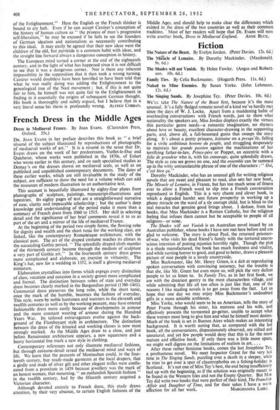Fiction
The Nature of the Beast. By Evelyn Jordan. (Peter Davies. 12s. 6d.) The Singing Sands. By Josephine Tey. (Peter Davies. 10s. 6d.) WE 'LL take The Nature of the Beast first, because it's the most unusual. It's a fully fledged romatic novel of a kind we've hardly met since the days of W. J. Locke. Apart from a maddening habit of overloading conversations with French words, just to show what nationality the speakers are, Miss Jordan displays exactly the virtues this particular genre needs—a romantic imagination, no shyness about love or beauty, excellent character-drawing in the supporting parts, and, above all, a full-bosomed gusto that sweeps the story along. It's about a pretty princess, lointaine on a presqu' Ile, falling for a virile ambitious homme du peuple, and struggling desperately to maintain her grande passion against the machinations of her terrifying father-in-law, Prince-pere or Poppet, an eccentric with a folie de grandeur who is, with his entourage, quite splendidly drawn. The style as you see grows on one, and the ensemble can be summed up in the witty untranslatable phrase of one of the characters : " Oul, c'est bien ca."
Dorothy Mackinder, who has an unusual gift for writing religious novels that are sweet and pleasant to read, also sets her new book, The Miracle of Lemaire, in France, but has too much sense of fitness ever to allow a French word to slip into a French conversation reproduced in English. This is a very chaste and clever book, in which a degraded hamlet sees future prosperity in working up a phony miracle on the word of a sly corrupt child, but is blind to the real miracles that genuine good brings about. I deduce, from her books, that Miss Mackinder is a Roman Catholic, but the religious feeling that infuses them cannot but be acceptable to people of all religions—or none.
The Shades will not Vanish is an Australian novel issued by an Australian publisher, whose books I have not met here before and am glad to welcome. The story is about Paul, the returned prisoner- of-war, who visits his dead friend's family with the tortured uncon- scious intention of putting injustice horribly right. Though the plot is a shade manufactured, the book has much freshness and vitality, and while turning horror to good, and good to better, draws a pleasant picture of nice people in a lovely countryside.
Miss Buckmaster, like Mr. Henry Green, is a dab at reproducing spoken conversation with convincing accuracy, but the trouble is that she, like Mr. Green but even more so, will pick the very dullest people to let us listen to. In Family Ties, as in her first book, we are with the dreariest gentry in the most characterless village, and while admitting that life all too often is just like that, one of the reasons I like reading novels is to get away from the fact. Let us hope that one day we may enjoy Miss Bucicmaster's undoubted gifts in a more amiable ambience. Miss Yorke, who would seem to be an American, tells the story of Peter Frame through his sister, his mistress and his wife, and effectively presents the tormented go-getter, unable to accept what these women most long to give him and what he himself most desires. Much of the book is set in Buenos Aires which makes an interesting background. It is worth noting that, as compared with the last book, all the conversations, dispassionately observed, are stilted and unnatural, and yet few people would deny that this is far the more mature and effective book. If only there was a little more space, we might well digress on the limitations of realism in art. . . .
After these rather feminine books, comes the last Josephine Tey, a posthumous novel. We meet Inspector Grant for the very last time in The Singing Sands, puzzling over a death in a sleeper, while he tries-to get over a spot of claustrophobia on a fishing-holiday in Scotland. It's not one of Miss Tey 's best, the end being insufficiently tied up with the beginning, as if the solution was originally meant to be found in the Western Isles and not _the Empty Quarter. But Miss Tey did write two books that were perfect of their kind, The Franchise Affair and Daughter of Time, and for their sakes I have a warn)


































 Previous page
Previous page